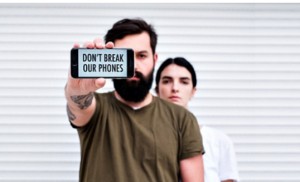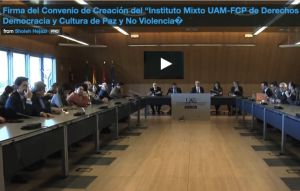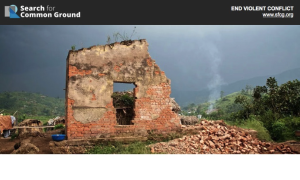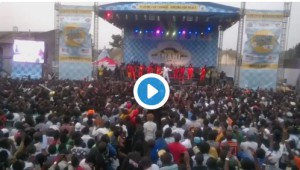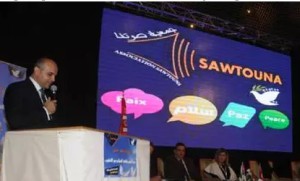LIBERTÉ DE L’INFORMATION
Une déclaration reçu par email du Congo Peace Network
Confrontée depuis de décennies à une situation de « guerres récurrentes » entretenue par les acteurs locaux et régionaux dont le Rwanda et l’Ouganda qui ont soutenus des mouvements récurrents politico-militaires Congolais de libération (AFDL, RCD et MLC) ; la RDC va d’accord de paix en Accord de paix, puis d’accord de paix en constitution de transition ayant pour mission principale de doter à la RDC un cadre institutionnel et démocratique cela par la constitution du 18 février 2006.

La plus part de ces accords de paix ont été signés sous l’égide de la communauté Internationale on peut, à ce sujet citer parmi les plus importants de ces accords ayant préludé l’Actuelle constitution, notamment, l’Accord de cessez-le feu de LUSAKA du 30 juillet 1999 ; l’Accord global et inclusif sur la transition en RDC, signé le 17 Décembre 2002, à Sun City, en Afrique du Sud et la constitution de la transition du 4 Avril 2003 qui donna naissance au gouvernement de 1+4 c’est-à-dire 1 Président et 4 Vice-Présidents qui avaient pour objectif global de conduire la RDC vers une démocratie durable en poursuivant 5 objectifs spécifiques principaux, assignés à cette dernière, à savoir :
1. La réunification, la pacification, la reconstruction du pays, la restauration de l’intégrité territoriale et le rétablissement de l’autorité de l’Etat sur l’ensemble du territoire National;
2. La réconciliation nationale ;
3. La formation d’une armée nationale, restructurée et intégrée ;
4. L’organisation des élections libres, démocratiques et transparentes à tous les niveaux
permettant la mise en place d’un régime constitutionnel démocratique ;
5. La mise en place des structures devant aboutir à un nouvel ordre politique. En effet, pour matérialiser la volonté ainsi exprimée par les participants au Dialogue Inter congolais, le sénat, Issu de l’Accord Global et inclusif précité, a déposé, conformément à l’article 104 de la constitution de la transition du 04 Avril 2003, un Avant-projet de la nouvelle constitution à l’Assemblée nationale qui l’a adopté sous forme de projet de constitution soumis au référendum populaire le 18 Décembre 2005.
I. NOUVELLE CONSTITUTION, NOUVEAU PROJET DE SOCIETE ET NOUVEL ORDONNANCEMENT JURIDIQUE EN RDC : LA CONSTITUTION DU 18 FEVRIER 2006.
Adoptée par le parlement le 16 mai 2005, soumise le 18 Décembre 2005 au référendum dont les résultats officiels ont été publiés par la commission électorale indépendante le 11 Janvier 2006 et validés par la cour suprême de justice en date du 04 février 2006 ; la constitution de la 3e République a été solennellement promulguée le 18 février 2006. Pour les fils et filles du Congo- Kinshasa, cette date marquait le début de l’épreuve de l’effectivité de notre démocratie, le test de l’efficacité de nos institutions et la maturité politique des acteurs politiques et de la population à préserver les acquis de cette Constitution.
En outre ; que ceux-ci (les congolais) aient, au référendum, voté « Oui » ou « non » qu’ils se soient abstenus au moyen d’un bulletin blanc ou par le boycott électoral, ils avaient apparemment tous le même message et la même préoccupation : « Celle de changer la configuration des Institutions dans un sens qui apporte le renouveau sur le plan sécuritaire, politique et socio-économique ». L’essentiel résidait dans le geste électoral si longtemps attendu, pour lequel bien de nos compatriotes ont, et continuent à payer de leur sang ; ce qui comptait c’était ; pour toute la Nation et la Communauté, « l’expression citoyenne libre de participation du corps électoral à la vie politique et démocratique de la Nation ». Quoi plus d’étonnant de constater que, à 83%, les Congolais s’étaient massivement prononcés en votant par « oui » par voie des urnes, car cette constitution définissait « la nouvelle trajectoire » d’un peuple longtemps meurtri et désespéré, qu’est le peuple congolais.
L’événement de cette constitution de 2006 est assurément marquant pour qu’on lui consacre non seulement une journée de célébration pleine d’émotion et de symbole, mais aussi et surtout toute notre attention, car porteur d’espoir sur les plans politique, économique et social. Fort malheureusement, jusqu’ici, beaucoup parmi nous n’avaient pas fréquenté de près ce texte fondamental, loi « des valeurs sociales essentielles, règles suprêmes fondant l’autorité étatique, organisant ses pouvoirs et ses institutions, lui imposant des limitations spécifiques en garantissant les libertés aux particuliers ».
Les axes prioritaires que les pères de la constitution du 18 Février 2006 s’étaient assignés étaient entre autre : l’Etat de droit, la démocratie et la bonne gouvernance ; le respect de la dignité de la personne humaine avec une attention particulière pour les personnes vulnérables (enfants, femmes, vieillards, minorités, prisonniers, étrangers, réfugiés, etc.) ; la protection des libertés publiques et des droits fondamentaux de la personne et de la famille ; la paix, la sécurité, l’unité nationale et l’intégrité du territoire national, le développement socio-économique, la libre entreprise et la juste redistribution des richesses nationales ; la justice et la lutte contre la corruption et l’impunité, etc…autant des valeurs socio-culturelles économiques et politiques que la constitution de 2006 pose comme fondement de la République et de la nouvelle société Congolaise.
Cependant, après dix années d’existence de constitution de 18 Février 2006 au 18 Février 2016, toutes ces valeurs constitutionnellement garanties, reconnues, protégées aux citoyens congolais, ont-elles été respectées et réalisées par les institutions étatiques et démocratiques congolaises?
Quels sont les défis, les avancées significatives et les perspectives d’avenir en rapport avec la constitution du 18 Février 2006 pour la RDC ?
II. APPORT DE LA CONSTITUTION DU 18 FEVRIER 2006 SUR LA CONSOLIDATION DE LA PAIX, LA SECURITE, LA JUSTICE, LA DEMOCRATIE, LA BONNE GOUVERNANCE, LE RESPECT DES DROITS HUMAINS EN RDC.
Les tendances des observateurs divergent selon qu’ils s’agissent de partisans de la majorité et de ceux de l’opposition Congolaise d’une part, et de la société civile d’autre part.
Pour les tenants de la thèse développée par la classe politique, actuellement au pouvoir depuis les années 2001 à nos jours, sous l’Appellation « Majorité présidentielle » en sigle « M.P » ; la RDC a connu une avancée significative en matière de démocratie, sécurité, paix, bonne gouvernance, Justice et droits humains.
a) La démocratie : Election
Depuis son accession à l’indépendance, la RDC n’avait jamais organisé une « élection » qu’on pouvait qualifier de : Libre, transparente, démocratique et crédible.
Pour la première fois, en 2006 nous avons eu à participer aux élections provinciales, nationales et présidentielles qui ont été saluées et encouragées par la communauté internationale, sous bien sûr la direction de la Commission Electorale Indépendante, institution d’appui à la démocratie, présidée par l’Abbé Apollinaire MUHOLONGU MALUMALU.
En 2011 par contre, la C.E.I fut changé en Commission Electorale Nationale Indépendante (CENI), qui a organisé les élections qui ont une fois de plus conduit le pays dans une instabilité politique et sécuritaire jusqu’à donner naissance à des groupes rebelles à l’instar du Mouvement du 23 Mars (M23) ; qui revendiquait notamment la légitimité du pouvoir central, car selon plusieurs observateurs tant nationaux qu’internationaux, les élections législatives et présidentielles de 2011 en RDC étaient entachées de beaucoup d’irrégularités et cela suite à une tricherie électorale institutionnalisée orchestrée grâce à Monsieur Pasteur NGOY MULUNDA Daniel, alors président de la CENI de l’époque. . .
b) La paix et la sécurité :
En matière de paix et de la sécurité, il faut savoir que les efforts ont été fournis et consentis, mais malgré tout ça, il reste encore beaucoup à faire.
Car la partie Est de la RDC connait une instabilité sur le plan sécuritaire à cause de la résurgence des groupes armés qui pullulent dans bien de territoires dans les provinces du Nord- Kivu et du Sud Kivu d’abord, puis dans l’ancienne province orientale voire même dans certains coins et recoins de l’ex-province du Katanga.
Particulièrement la population du Nord-Kivu n’a jamais vécu dans une situation d’accalmie qui rassure ; car les massacres de populations dans les territoires de BENI, LUBERO, RUTSHURU, MASISI et WALIKALE constituent même la source d’incertitude sur l’apport en matière de paix et de sécurité tel que fixées par la constitution. Bref, les autorités nationales, provinciales et locales doivent encore fournir beaucoup d’efforts pour que la paix et la sécurité des personnes et de leurs biens soient leur priorité par excellence.
c) La Justice et le respect de droits humains
En RDC par contre, la justice semble constituer aux yeux de citoyens une parodie ; car elle est seulement et quelques fois favorable aux seuls nantis ou fort financièrement et politiquement, mais elle apparait plus défavorable aux citoyens les plus faibles matériellement, politiquement et financièrement oubliant que « tous les congolais sont égaux devant la loi et ont droit à une égale protection des lois » en vertu de l’article 12 de la constitution. Une maxime dit : « La justice élève une nation ».
Alors que la constitution précise que le pouvoir judiciaire est indépendant des pouvoirs exécutifs et législatifs (Art 149) ou la réalité sur terrain prouve le contraire. Cette situation met en mal les animateurs des cours et tribunaux ; bien que jouissant de l’indépendance, l’impartialité et la neutralité dans l’exercice de leur mission qui est celle de dire le doit ».
Pour ce qui est du respect de droits et libertés fondamentaux, c’est le pouvoir judiciaire qui est le garant des libertés individuelles et des droits fondamentaux des citoyens, en vertu de l’article 150 de la constitution. Est-ce que cette disposition est-elle respectée et observée dans sa plénitude en RDC ? Si oui, comment sont traités les prisonniers dans les établissements pénitentiaires (prisons, cachots, Amigo) ? Quelques personnes qui ont un regard tourné contre la vision de la MP (les prisonniers politiques issus de partis politiques d’opposition et militants activistes de droits de l’homme) ; elles sont les plus souvent victimes de détentions illégales et d’arrestations arbitraires, des traitements dégradants et inhumains voire même de la torture ; cela d’une part leur infliger par les agents des FARDC, PNC, ANR et autres services de sécurité ; ce qui fait appel à des violations des droits et libertés fondamentaux par les autorités publiques en RDC. Il reste encore beaucoup à faire pour que le respect des droits humains soit une réalité en RDC.
d) Développement socio-économique : redistribution des richesses nationales
La situation socio-économique en RDC est tellement alarmante suite à l’insécurité et le chômage qui se soldent en misère sans limite de la population congolaise en général. Tout cela serait dû à quoi ? L’œil de l’observateur constate qu’en RDC, une petite masse de congolais se partage une grande partie de richesses nationales au détriment de toute une grande masse de citoyens, c’est-à-dire seuls les gouvernants bénéficient des richesses du pays en écartant les gouvernés ; tout en ignorant que la satisfaction de l’intérêt général c’est l’objectif primordial pour tout gouvernement ou pouvoir responsable et digne de ses noms.
En outre, aussi longtemps que la problématique de la famine, de l’éducation, du chômage et de l’insécurité ne sera pas résolue positivement, le climat socio-économique congolais restera sans succès dans son chemin du développement.
3. QUELQUES AVANCES SIGNIFICATIVES
Sur le plan territorial, la mise en œuvre de 26 provinces prévues à l’article 2 de la constitution est une réussite. Cependant, le découpage territorial effectif pour une bonne décentralisation en RDC, a par sa mise en place, été violé par le Gouvernement central. Pour leur organisation et leur fonctionnement, le pouvoir central a procédé à la « nomination des commissaires spéciaux » ; une appellation « inconstitutionnelle » au lieu d’organiser l’élection de gouverneurs des provinces dans les 21 provinces nouvellement opérationnelles. Alors que les 5 provinces dont KINSHASA, BAS-CONGO, NORD-KIVU, SUD-KIVU et MANIEMA, les gouverneurs sont répondants et ont l’obligation de rendre compte en vertu du principe de recevabilité du gouvernement provincial devant l’Assemblée provinciale ; Quel est le sort des commissaires spéciaux nommés ? Pourront-ils ou auront-ils l’obligation de rendre compte à la population (ou au président de la République qui les a nommés ? Cette nomination est inconstitutionnelle et se veut une porte de vouloir plonger le pays dans la dictature ou simplement l’ingouvernabilité ; car sans doute, « c’est à celui qui a nommé que revient le pouvoir de révoquer » c’est-à-dire ils sont redevables devant la personne du chef de l’Etat actuel contrairement aux cinq gouverneurs des provinces qui n’ont pas subi le découpage territorial.
Bref, il sied de préciser que l’entreprise à laquelle nous a invité la constitution est immense, car selon nous, maintenant que nous avons une constitution, notre devoir de citoyen est, et serait de la préserver, de la mûrir et de lui donner effet en la reconnaissant comme la « norme juridique de base et de référence dans l’édification de l’Etat de droit auquel tous nous aspirons, dirigeants que dirigés ou encore gouvernants que gouvernés».
e) Sur le plan des infrastructures:
Plusieurs ouvrages ont été soit construits et réhabilités dans les domaines de transport, santé, éducation, électricité, etc. bien que des kilomètres de routes soient asphaltés, que des hôpitaux et centres de santé soient construits, les écoles, etc. soient réalisés, il reste encore beaucoup à faire, car la RDC est toujours en chantier.
(Voir suite sur colonne de droite. . . )
(Cliquez ici pour une traduction anglaise de cet article.)
(. . . suite)
4. LES DEFIS MAJEURS DE LA CONSTITUTION
En principe, la constitution de la 3e République en RDC, devrait définir les règles et ou les principes selon lesquels seront résolues les crises politiques qui secouent le Congo-Zaïre depuis son accession à l’indépendance ; ce qui veut dire qu’elle établirait les règles normatives pour régir la République traduisant impérativement les soucis fondamentaux du peuple congolais et, en établissant une société politique, fondée sur des institutions fiables et stables. Les rédacteurs de la constitution de la RDC, ont-ils atteint cet objectif ? Nous ne le pensons pas.
1. Découpage territorial :
Prévu à l’article 2, dispose que la RDC compte 26 provinces.
En réalité, la redéfinition territoriale n’est pas en soi une mauvaise idée. Bien au contraire, sinon nécessaire du moins souhaitable ; car ce découpage prévu dans la constitution de 2006 constitue une bombe à retardement par ce qu’elle peut entrainer ou rallumer les « passions ou idées sécessionnistes ou séparatistes » de ceux qui ignoreront la quintessence de la notion d’intérêt général de l’Etat, de la nation ou encore de l’unité nationale du peuple congolais.
Qu’on se le dise, ce risque de sécession ou séparation n’est pas une hypothèse fausse. Pour s’en convaincre ; il suffit de scruter la « composition démographique » de chacune de ses provinces. A titre d’exemple ; la province de TSHUAPA n’est formée que par les « MONGO » ; Les provinces de Nord et Sud-Ubangi, sont à leur tour respectif, composées ou formées respectivement par des « NGBAKA » et des « NGBANDI ». Finalement, on a l’impression que les autorités congolaises, en organisant ce découpage, voulaient par le biais de la constitution « chercher à légitimer la scission du pays et par conséquent la désunion du peuple congolais ». Au fond, les questions du découpage territorial et de la décentralisation n’auraient-elles pas été amalgamées, car en elles-mêmes, plusieurs parodies en sont visibles (la décentralisation manque de succès à cause du non-respect de la retenue à la source prévue à l’article 175. Al. 2.. qui stipule que : « … la part des recettes à caractère national allouées aux provinces est établie à 40%. Elle est retenue à la source ». Cette disposition n’a jamais été respectée ça fait de cela 10 années et les provinces continuent à d’être muselées dans la rétrocession que le pouvoir central leur impose en violation de l’article 175 Al. 2. qui prévoit la « retenue à la source.
2. La gratuité de l’enseignement primaire en RDC,
Elle n’a jamais été une réalité alors que le prescrit de l’article 43 Al 3 dispose clairement que : « l’enseignement primaire est obligatoire, et gratuit dans les établissements publics ». La constitution prévoit l’obligation et la gratuité de l’éducation primaire en vue de bannir l’analphabétisation de la population. Jusqu’à présent dans aucun établissement public où cette disposition est respectée, ce qui a pour conséquence d’accentuer et d’accroître le phénomène « Enfants de la rue dans bien de villes et villages du pays, car tous les enfants dont les parents sont sans emploi, vulnérables, handicapés et déplacés internes se trouvent exclus de l’éducation alors que et plutôt reconnus comme espoir de l’avenir.
Pour le Président MOBUTU « la jeunesse c’est la sève qui fera vivre l’avenir du pays ; l’une de ses idées pédagogiques ».
Tant que ce droit à l’éducation ne sera pas garanti pour tous les enfants, nous n’espérons vraiment pas que le phénomène « enfants de la rue se terminera ».
3. Le pluralisme politique en RDC :
L’article 8 dispose que : « l’opposition politique est reconnue en République Démocratique du Congo. Les droits liés à son existence, à ses activités et à sa lutte pour la conquête démocratique du pouvoir sont sacrés. Ils ne peuvent subir de limites que celles imposées à tous les partis et activités politiques par la présente constitution et la loi ».
Partant de la lecture critique de cette disposition, on reconnait à l’opposition sa noble mission de « conquête de pouvoir » ;
Mais elle ne peut conquérir le pouvoir que par la voie des élections libres, démocratiques, transparentes et crédibles.
Fort malheureusement, le passé nous dira que les élections de 2011, étaient seulement en faveur de la majorité, pour des raisons multiples : l’insécurité dans beaucoup de milieux et territoires sous contrôle des rebelles armés et les opposants, quelques-uns avaient du mal à aller y battre leur campagne pour éviter qu’ils ne soient lâchement abattus.
Cette année 2016, c’est l’année électorale, mais tout observateur et analyste averti a déjà vu de loin un report pur et simple de la tenue des élections à tous les échelons local, municipal, urbain, provincial, national et présidentiel, tout ceci par les manœuvres de la classe dominante et régnante qu’est la « Majorité présidentielle » sous les prétextes qui sont notamment :
« l’insécurité presque sur l’ensemble du territoire national plus particulièrement à l’Est (Nord & Sud-Kivu) ; la problématique dite des « nouveaux majeurs » par leur enrôlement pour qu’ils soient reconnus dans la base centrale de la CENI ; la donne des congolais de l’étranger et de manque de moyens financiers ». Comme conséquence, on impose à toutes les composantes politiques (majorité et opposition) et celles de la société civile de participer à « un dialogue national inclusif » visant plusieurs intérêts égoïstes du régime en place ; car la constitution ayant limité à deux (2) le mandat du Président de la République en vertu de l’article 220 ; celui-ci et sa famille politique ambitionnent la révision de cette disposition constitutionnelle pour solliciter peut être un troisième mandat.
Ce comportement de la majorité présidentielle actuelle, prouve en suffisance l’absence d’une volonté politique pouvant donner la chance à l’alternance politique et démocratique à la jeune démocratie en RDC.
Rappelons que le projet de société, contrat social qu’est la constitution du 18 février 2006 se propose comme mission principale « la construction d’un Etat démocratique que soit un Etat de la bonne gouvernance » au centre de l’Afrique, qu’est la RDC.
Les perspectives que nous nous proposons sont entre autres centrées au tour de :
1. Faire respecter les piliers de la démocratie en RDC qui sont : la souveraineté, la justice, l’égalité ; la primauté de la loi, la tolérance, la transparence, la redevabilité des gouvernants, la garantie des droits humains, le pluralisme politique, l’acquisition démocratique et pacifique de pouvoir, les élections libres, démocratiques et transparentes, les résultats justes des urnes, la protection des minorités et l’entreprenariat ;
2. La nécessité de préparer et de faire aboutir le processus électoral de 2016 (l’activité à accomplir dans l’immédiat).
3. Pour les acteurs, les institutions et personnes physiques, qui ont la charge de faire fonctionner le régime démocratique défini par la constitution, mettre en avant la satisfaction de l’intérêt général ;
4. Il faut une assiette financière nécessaire au fonctionnement et à l’équipement de l’appareil de l’Etat dans ses différentes composantes telles que définies par la constitution ;
5. Il faut la formation et la mise en œuvre du cadre politique et sécuritaire de l’Etat favorisant le climat d’investissement étranger en RDC ;
6. Il faut une formation et une mise en œuvre du cadre socio-culturel et économique de l’Etat favorisant le développement du pays ;
7. Il faut que le pouvoir mette en œuvre une nouvelle politique de création d’emploi, pour la jeunesse et la nation tout entière.
Pour sa part, Abraham Lincoln, définit la démocratie comme « un pouvoir du peuple, par le peuple et pour le peuple.
Lorsque l’Etat veut s’offrir un statut juridique et les moyens de sa survie et de son fonctionnement, l’Etat se dote d’une constitution. L’Etat et la constitution sont intimement liés l’un à l’autre, parce que l’Etat est en définitive l’habillage juridique du pouvoir public. Il est aussi sage de rappeler que la constitution du pays est une œuvre lente, longue, parfois rigide ou souple, car assujettie à des ralentissements, à des modifications du contexte socio-politique et économique, bref à des dynamiques touchant la vie en société.
En outre, nous rappelons tous les acteurs politiques de la RDC, que la politique est une mission sacrée, c’est-à-dire qu’elle doit servir à l’amélioration du bien-être de tous sans exception surtout du peuple congolais et non pas à prendre celui-ci en outrage, et qui est plus dans sa propre patrie.
Hélas, notre constitution de 2006, bien que poursuivant le bonheur du peuple congolais ; l’homme politique congolais mal intentionné, considère à tort et à raison le peuple congolais comme « hypnotisé, amorphe, voire même naïf, oubliant qu’un jour viendra où ce peuple se lèvera et finira par prendre son engagement d’une lutte nécessaire pour défendre sa cause en toute dignité en vue de rendre la république une vitrine par excellence où règnera la paix, la sécurité et où la démocratie, la bonne gouvernance, le respect des droits humains feront un fondement du nouveau décollage pour cette jeune patrie démocratique ; qu’est la RDC.
En définitive, « chères autorités politico-administratives de la RDC, il faut savoir que la tranquillité de l’âme est une garantie de longévité ; c’est-à-dire que le respect de la constitution est un gage de bonne conduite pour assurer la tranquillité de l’âme du peuple congolais ».
Le Président Kabila ainsi que tous les acteurs politiques doivent comprendre que la Constitution actuelle et son respect sont la clause du partenariat national pour la paix et la dignité pour tous compte tenu de son historique. Ne pas la respecter est un acte inacceptable pour le peuple congolais en général et la jeunesse en particulier car en aucun cas, ni en aucune circonstance nous allons nous résigner et renoncer à nos droits, a notre bonheur, a notre dignité et sécurité , et accepter de cesser de rêver d’un Congo où tous les êtres humains doivent vivre égaux, libres en droit et en dignité.
AU REGARD DE CE QUI PRECEDE, NOUS JEUNES DES CLUBS MEMBRES DU CONSEIL DES CLUBS DE CONGO PEACE NETWORK POUR LA PAIX, LES DROITS DE L’HOMME, LA JUSTICE ET LA NON VIOLENCE, DECLARONS CE QUI SUIT A L’OCCASION DU 10eme ANNIVERSAIRE DE LA CONSTITUTION DE LA REPUBLIQUE DEMOCRATIQUE DU CONGO :
1. Toute violation de la Constitution du 18 Février 2006 telle que modifiée à ce jour sera inacceptable car susceptible de détruire le sens de vie commune du peuple congolais pour la paix, la dignité, la justice et la réconciliation ;
2. La constitution du 18 Février 2006 doit été respectée par les institutions du pays, tous les acteurs politiques et l’ensemble du peuple congolais car elle est la clause du partenariat national pour la paix et la dignité pour tous les congolais.
3. La Commission Electorale Nationale Indépendante doit publier un calendrier consensuel qui garantit l’alternance démocratique en 2016 en respectant l’actuelle Constitution dans sa lettre et son esprit ;
4. Nous mettons en garde toute personne qui va tenter de troubler l’ordre public et la quiétude sociale des congolais par la violation des prescrits de la Constitution ainsi que la non publication du Calendrier consensuel des échéances électorales.
5. La paix, l’unité et l’amour doivent régner avant, pendant et après les élections qui doivent être organisées cette année 2016.
Que Dieu bénisse et protège la République Démocratique du Congo
Fait à Goma, le 18 février 2016
Pour Congo Peace Network
Patrick Mulemeri
Coordonnateur
Contresigne par:
LE CONSEIL DES CLUBS DE CONGO PEACE NETWORK
